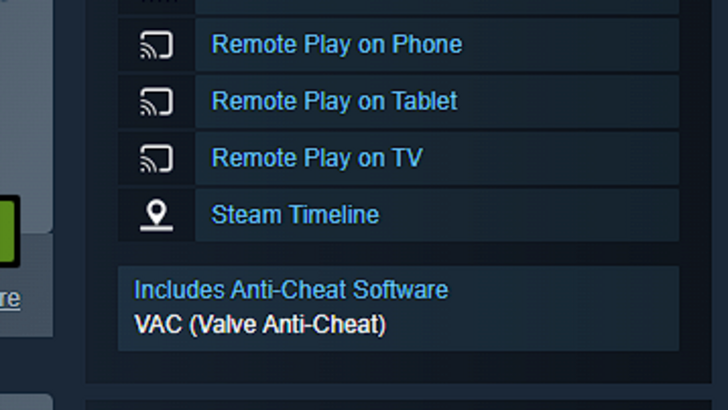Steam Anti-Cheat Tool Stirs Division
- By Ethan
- Feb 22,2025
Steam's New Anti-Cheat Disclosure Feature: A Step Towards Transparency?
 Steam has implemented a new requirement for developers: disclosing whether their games utilize kernel-mode anti-cheat systems. This move aims to enhance transparency and address player concerns regarding the potentially intrusive nature of such technology.
Steam has implemented a new requirement for developers: disclosing whether their games utilize kernel-mode anti-cheat systems. This move aims to enhance transparency and address player concerns regarding the potentially intrusive nature of such technology.
Valve's Enhanced Anti-Cheat Transparency
 Via a recent Steamworks API update, developers can now specify the anti-cheat software used in their games. While disclosure for non-kernel-based systems remains optional, mandatory declaration is now required for kernel-mode anti-cheat. This addresses growing player apprehension about the potential performance impacts and security/privacy implications of these systems.
Via a recent Steamworks API update, developers can now specify the anti-cheat software used in their games. While disclosure for non-kernel-based systems remains optional, mandatory declaration is now required for kernel-mode anti-cheat. This addresses growing player apprehension about the potential performance impacts and security/privacy implications of these systems.
Kernel-mode anti-cheat, which directly examines processes on a player's device, has been a source of debate. Unlike traditional methods, it accesses low-level system data, raising concerns among some players.
 Valve's decision reflects feedback from both developers seeking clearer communication channels and players demanding greater transparency regarding anti-cheat mechanisms and software installations. The update facilitates this communication, providing players with more informed choices.
Valve's decision reflects feedback from both developers seeking clearer communication channels and players demanding greater transparency regarding anti-cheat mechanisms and software installations. The update facilitates this communication, providing players with more informed choices.
 Valve's official statement highlights the need to bridge the information gap between developers and players concerning anti-cheat implementation. This change benefits both parties by fostering open communication and informed decision-making.
Valve's official statement highlights the need to bridge the information gap between developers and players concerning anti-cheat implementation. This change benefits both parties by fostering open communication and informed decision-making.
Mixed Community Reception
 Launched on October 31st, 2024, at 3:09 a.m. CST, the update is already visible, as demonstrated by Counter-Strike 2's updated Steam page showcasing its use of Valve Anti-Cheat (VAC). While many praise Valve's consumer-focused approach, some criticisms have emerged. Minor issues like grammatical inconsistencies and perceived awkward wording have been noted.
Launched on October 31st, 2024, at 3:09 a.m. CST, the update is already visible, as demonstrated by Counter-Strike 2's updated Steam page showcasing its use of Valve Anti-Cheat (VAC). While many praise Valve's consumer-focused approach, some criticisms have emerged. Minor issues like grammatical inconsistencies and perceived awkward wording have been noted.
 Furthermore, questions remain regarding the practical implementation of the feature, including language translation and the precise definition of "client-side kernel-mode" anti-cheat. The ongoing debate surrounding the invasiveness of kernel-mode anti-cheat continues, with PunkBuster cited as a prime example.
Furthermore, questions remain regarding the practical implementation of the feature, including language translation and the precise definition of "client-side kernel-mode" anti-cheat. The ongoing debate surrounding the invasiveness of kernel-mode anti-cheat continues, with PunkBuster cited as a prime example.
Despite the mixed initial response, Valve's commitment to consumer-centric platform improvements is evident, as shown by their transparency regarding recent California consumer protection legislation. Whether this initiative fully alleviates community concerns about kernel-mode anti-cheat remains to be seen.
Latest News
more >-

- Genshin Impact Luna I update arrives next month
- Dec 17,2025
-

-

-

- Ragnarok M Classic Beta Starts Next Month
- Dec 17,2025
-




